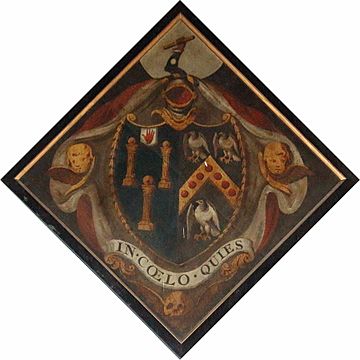Sir John Major, 1st Baronet facts for kids
Sir John Major (born May 17, 1698, died February 22, 1781) was an important British businessman and politician. He was known as the 1st Baronet. He started his career as a merchant, trading goods by ship. Later, he became a Member of Parliament (MP) and a Sheriff of Sussex.
Contents
Early Life and Business Success
John Major was born in a town called Bridlington in Yorkshire, England. He began his career working on ships, trading with places like Stockholm. Around the age of 30, he stopped sailing. Instead, he started a very successful business trading iron. He became one of the biggest iron dealers in the country.
His business made him very rich. He bought a lot of land in Suffolk and Sussex. He also owned land in other parts of England. His properties were worth a lot of money each year. Even with his wealth, he helped his country during wartime. He used his ships to transport soldiers when needed. This often cost him a lot of money.
Family and Connections
In 1724, John Major married Elizabeth Dale. She was also from a merchant family in Bridlington. They had two daughters together.
- Their first daughter, Anne, married John Henniker in 1747.
- Their second daughter, Elizabeth, married Henry Brydges, 2nd Duke of Chandos in 1767.
Becoming a Member of Parliament
When he was 60 years old, Sir John Major decided to enter politics. In 1761, he was elected as an MP for Scarborough. This town was close to Bridlington, where his business was strong. His son-in-law, John Henniker, also became an MP at the same election. He represented Sudbury.
Sir John Major and John Henniker worked closely together in politics and business. They looked for government contracts. These were special agreements to provide goods or services to the government. At that time, MPs often got these contracts more easily than other business people. For example, they secured a contract to supply food to British soldiers in West Florida. They also received large grants of land in Nova Scotia. Each of them received about 20,000 acres (about 81 square kilometers) of land.
Receiving a Special Title
John Henniker worked hard to convince the government to give John Major a special title. He wanted Major to become a Baronet. A Baronet is a person who has a hereditary title, meaning it can be passed down in the family. It is a rank below a Baron but above a Knight.
On July 5, 1765, John Major was made a Baronet. His title was "Baronet, of Worlingsworth Hall in the County of Suffolk." This title came with a special rule. It said that if Sir John Major had no sons, the title would pass to his son-in-law, John Henniker.
Just five days after he received this title, the government changed. The Prime Minister, George Grenville, who had supported Major, was removed from power. This meant that Sir John Major was very lucky to get his title when he did. He might not have had another chance.
Later Life and Death
At the next election in 1768, Sir John Major faced a candidate supported by the new government. He lost the election and did not try to become an MP again.
Sir John Major passed away on February 22, 1781, at the age of 82. As per the special rule, his son-in-law, John Henniker, became the next Baronet. Later, in 1800, John Henniker was given an even higher title, becoming Baron Henniker.
Sir John Major also held other important positions during his life. He was a Senior Elder Brother of Trinity House from 1741 to 1781. Trinity House is an organization that looks after lighthouses and helps sailors. He was also a director of the South Sea Company. In 1755 and 1756, he served as the High Sheriff of Sussex.
 | John T. Biggers |
 | Thomas Blackshear |
 | Mark Bradford |
 | Beverly Buchanan |


